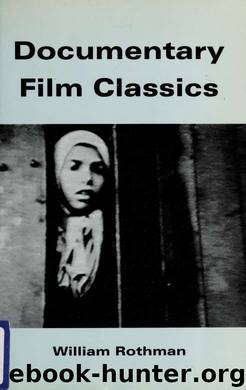Documentary film classics by Rothman William

Author:Rothman, William
Language: eng
Format: epub
Tags: Documentary films
Publisher: Cambridge ; New York : Cambridge University Press
Published: 1997-02-27T16:00:00+00:00
Chronicle of a Summer
Many Rouch films are enhanced, not diminished, when he uses them to win converts to “shared anthropology.” But that is because such films were already diminished by being made to be used for this purpose, diminished by the way they were made. Anai is not one of those films capable of enchanting an audience only when Rouch is present to screen it. For Rouch to treat it as if it were would be for him to diminish the film, to deny something about what it is, something about who he is. In truth, it must be admitted, only a few of Rouch’s dozens of films are in this category; only a few Rouch films merit comparison, as examples of the art of film, to masterpieces like Land without Bread or Night and Fog. Viewed as an example of the art of film, even Chronicle of a Summer is at times slapdash and incoherent, and not only because Rouch and Morin so often worked at crosspurposes. That is why I chose to write about the film by singling out two perfectly crafted sequences, rather than by addressing its overall form or structure or “message.”
Noting that the films that preceded it were very different from the films that followed it, I characterized Chronicle as a pivotal work in Rouch’s career. It might seem, rather, to be an anomaly, for it differs in crucial ways from all his other films, early or late. No Rouch film before or after Chronicle treats the people in it as characters in depth, takes such an interest in them as distinctive individuals worthy of acknowledgment in their own right. No other Rouch film focuses so intimately on the realm of the private - on the ways people quest for love, the ways they pursue happiness, the ways they work, the ways they live and think about their everyday lives. Not coincidentally, no other Rouch film is so passionately involved with the lives and thoughts of women.
Chronicle, for all its distinctiveness, is not really an anomaly, however; mythically, as it were, its making is profoundly meaningful within the context of Rouch’s career. In The Rules of the Game, Andre persuades his friend Octave (played by Renoir himself) to stop whatever he is doing in order to initiate — against Octave’s better judgment — a chain of events that ultimately leads to Andre’s death and Octave’s banishment or self-banishment. On the occasion of the invention of the lightweight synch-sound camera, Morin similarly persuaded his friend Rouch, against Rouch’s better judgment, to stop filming Songhay and Dogon rituals long enough to return to his own village to make a film about ordinary Parisians, a film promising to change the way they live and think.
Within Chronicle, Rouch may appear the optimist and Morin the pessimist. But it is Morin who expected that their film would spread love, and Rouch who entered into the project believing that the people they were filming - like all of us in Western society - were hopelessly stuck in “private traps.
Download
This site does not store any files on its server. We only index and link to content provided by other sites. Please contact the content providers to delete copyright contents if any and email us, we'll remove relevant links or contents immediately.
Call Me by Your Name by André Aciman(20521)
Ready Player One by Cline Ernest(14679)
How to Be a Bawse: A Guide to Conquering Life by Lilly Singh(7489)
Wiseguy by Nicholas Pileggi(5791)
The Kite Runner by Khaled Hosseini(5183)
On Writing A Memoir of the Craft by Stephen King(4947)
Audition by Ryu Murakami(4933)
The Crown by Robert Lacey(4818)
Call me by your name by Andre Aciman(4691)
Gerald's Game by Stephen King(4656)
Harry Potter and the Cursed Child: The Journey by Harry Potter Theatrical Productions(4507)
Dialogue by Robert McKee(4406)
The Perils of Being Moderately Famous by Soha Ali Khan(4221)
Dynamic Alignment Through Imagery by Eric Franklin(4218)
Apollo 8 by Jeffrey Kluger(3713)
The Inner Game of Tennis by W. Timothy Gallwey(3689)
Seriously... I'm Kidding by Ellen DeGeneres(3637)
How to be Champion: My Autobiography by Sarah Millican(3594)
Darker by E L James(3520)
